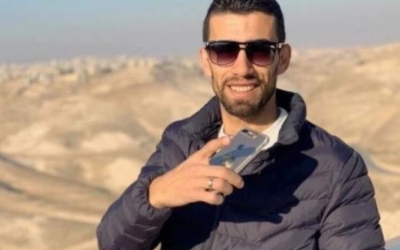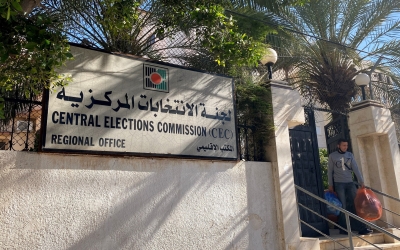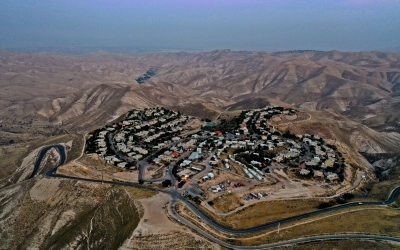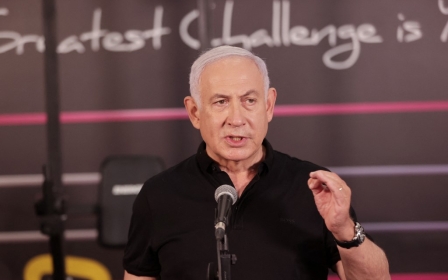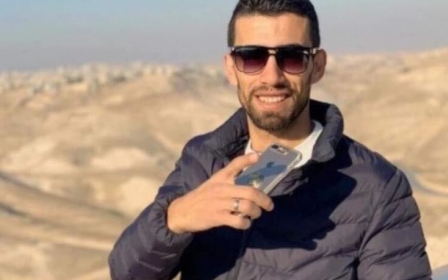Top US lawmaker links Palestinians to antisemitism and hate crimes
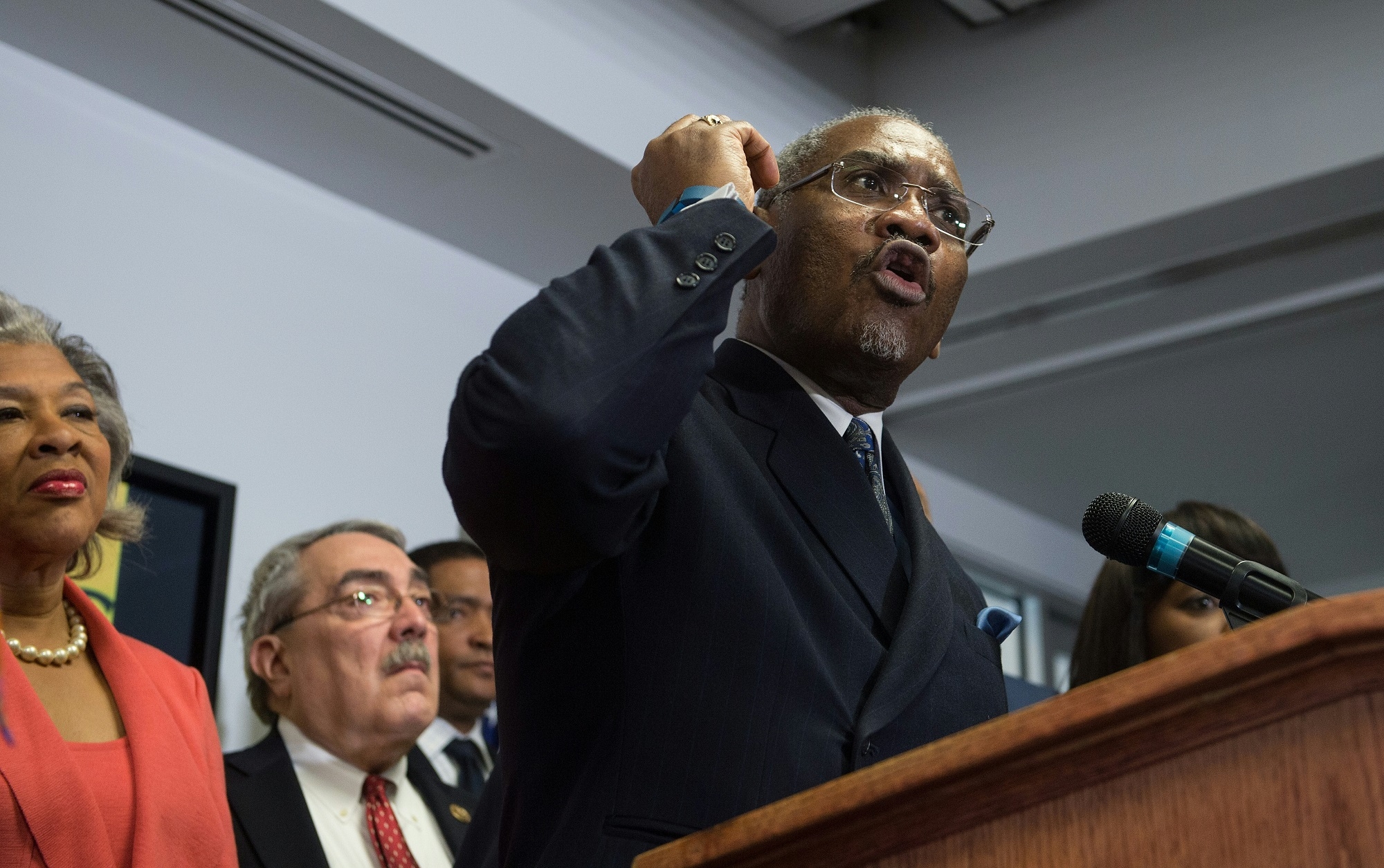
Congressman Gregory Meeks, a key Democrat, linked Palestinians to the rise of global bigotry, and said he would address the upsurge of racism and hate crimes when he talks to Palestinian leaders.
Meeks, who serves as the chair of the powerful House Foreign Affairs Committee, lavished praise on Israel at a Brookings Institution virtual conference on Wednesday, and vowed to bolster America's "social, economic and political ties" with its Middle Eastern ally.
"I know how important Israel is to us as a partner, and I am committed to that partnership," Meeks said.
When addressing a question about resuming humanitarian aid to the Palestinians, Meeks spoke vaguely about providing assistance to those who need it and instead highlighted his strong support for Israel and the need to combat antisemitism.
"I also need to state that I want to make sure that when I talk to Palestinians - when I get a chance to it, I believe that we will - that I'm going to serve as a strong voice against antisemitism, which has been rising along with racism around the world and hate crimes," Meeks added.
Former President Donald Trump had halted almost all forms of US aid to the Palestinians, including assistance to the UN agency for Palestinian refugees (UNRWA), hospitals in East Jerusalem and US grants to the Palestinian Authority.
Trump's successor, President Joe Biden, has vowed to restore the aid, but pro-Israel Democrats and US laws that put stringent conditions on funding for Palestinians may prove to be a hurdle in that effort.
'Victimising the victim'
Meeks' remarks about antisemitism and hate crimes in the context of diplomacy with the Palestinians come weeks after a mob of white supremacists violently stormed the US Capitol in an effort to thwart the certification of President Joe Biden's election.
Khalil Jahshan, executive director of the Arab Center Washington DC, accused Meeks of "anti-Palestinian hatred" that antagonises the victims in the conflict.
"It's victimising the victim. There is a double standard here. The Palestinians are not in occupation of Tel Aviv. The Palestinians are not in occupation of Jerusalem; it's the other way around," Jahshan told MEE.
Ahmad Abuznaid, the executive director of the US Campaign for Palestinian rights, echoed Jahshan's remarks.
"Rep. Meeks' comments lead me to believe that he's confused as to which party between Israel and Palestine is the one enforcing a brutal military occupation."
Abuznaid added that linking Palestinians to antisemitism and hate crimes is "disrespectful".
"Even in the question about restoring humanitarian aid to Palestinian hospitals, schools and refugees, he switched the conversation to antisemitism and talked about how it has grown across the world. So clearly, his thought process is that's the Palestinians' fault. And that is all we need to know about his current position," Abuznaid told MEE.
Meeks' office did not respond to MEE's request for comment by the time of publication.
Beth Miller, government affairs manager at JVP Action, a political advocacy group linked to Jewish Voice for Peace, accused Meeks of displaying "deep-seated prejudice against Palestinians".
"It is unacceptable that he cannot speak about releasing aid - a move that rights groups around the world have called for - without insinuating that Palestinians are antisemitic. This is both insulting and incorrect," Miller told MEE.
She also hit out at Meeks for failing to "even mention the Israeli military occupation of Palestine as the main reason Palestinians require humanitarian aid."
Despite the rise of white supremacy, Palestinians and Palestinian rights advocates, including members of Congress, regularly face accusations of antisemitism in Washington, which activists say aim to silence the debate around Israeli violations against Palestinians.
Hatem Abudayyeh, national chair of the US Palestinian Community Network (USPCN), said antisemitism has nothing to do with the Palestinian people and their struggle for freedom. He added that the Israeli government is "the main purveyor of hate and violence in the conflict".
"Maybe he should talk to Netanyahu about racism, white supremacy, and hate against Palestinians, Arabs and Muslims," Abudayyeh told MEE.
Unconditional support
On Wednesday, Meeks stressed that US military aid to Israel should remain unconditional, even if the Israeli government proceeds with plans to annex parts of the West Bank, which he acknowledged would deal a fatal blow to the two-state solution.
He said the 2016 memorandum of understanding (MOU) that grants Israel $3.8bn in US taxpayers' money should be left alone regardless of the policies of the Israeli government.
"I'm a firm believer that you have to stop annexation," he said. "I'm also a firm believer that Israel has the right to defend itself. And that's why I'm unequivocal in regards to support for the MOU, and that should not be touched at all."
The congressman said there may be provisions in US law that would limit how the aid is used, but he emphasised that he would not back any effort to condition or reduce the assistance.
"I want to be clear to my friends in Israel and to Prime Minister Netanyahu in particular that annexation is not the way forward, that it's a two-state solution, that we've got to sit down at the table and we've got to figure out," Meeks said.
"And I want to help on the other side because I realise some of the hindering that the Palestinians have. So, I want to make sure that I send a similar message that we want a two-state solution. I also send the message that the MOU is, in fact, unequivocal. I don't want anybody to get confused about that."
However, last year when Meeks was vying for the support of progressive groups, his commitment to aid to Israel was not as unequivocal.
"Annexation is anathema to a two-state solution, and America cannot be used by its proponents to justify a pro-annexation position or policy," Meeks told The Times of Israel last August. "On the contrary, the United States must be explicit in our opposition by applying pressure against Netanyahu should he annex territory, including leveraging US aid."
Zeina Ashrawi Hutchison, a Palestinian-American activist, said Meeks strategically avoided addressing the "well-documented and direct impact of the occupation and apartheid" on Palestinians when talking about aid.
"Even at the mention of a possibility of a conversation with the Palestinians, he feels obliged to reaffirm the unconditional and unwavering commitment to Israel and uses the prospects of aid as a means of serving Israeli interest," Ashrawi Hutchison told MEE.
"This highlights the continued and willful marginalisation of Palestinians and our rights in political discourse and allows israel to continue with its abuses with impunit."
New chair
Late in 2020, Meeks, of New York, comfortably won an internal Democratic vote for the Foreign Affair Committee's gavel, edging out Congressman Joaquin Castro, who had promised a more progressive outlook on foreign policy, including giving a voice to Palestinians on the panel.
Meeks replaced Eliot Engel, a staunchly pro-Israel hawk, as the committee's chair. Last year, Engel lost his House seat to a primary challenge by Jamaal Bowman, a progressive lawmaker who has been critical of the Israeli government's policies against the Palestinians.
Jahshan, of the Arab Center Washington DC, said the unconditional support that Israel enjoys in Congress - as demonstrated by Meeks' comments - harms US interests and the prospects of peace in the region.
"That has contributed over the years to Israeli intransigence - particularly on the part of governments like the current one led by Mr Netanyahu - because he knows that regardless of what he does, he's protected," Jahshan said.
He added that rhetorical support for the two-state solution from US politicians is meaningless without applying pressure on Israel to end the occupation of Palestinian territories.
"It's a red herring. They continue to mention it as a campaign slogan, but nobody is working seriously on it," Jahshan said of the two-state solution. "If they were, then Israel wouldn't have been allowed to build settlements so freely, to confiscate land and to violate the rights of the Palestinian people."
For his part, Abuddayyeh, of USPCN, said Meeks' assertions on Tuesday underscore the need for the Palestinian rights movement to seek allies in "the streets" with activists from other oppressed communities, including the movement for Black lives - not only in Washington.
"It's very unfortunate that Congressman Meeks is expressing unequivocal and unqualified support for Israel, even if it moves forward with annexation," Abudayyeh told MEE.
"The Democrat makes it abundantly clear what we already know, that no matter what party they are from, the vast majority of US Congress members ignore the civil and human rights of Palestinians."
Middle East Eye propose une couverture et une analyse indépendantes et incomparables du Moyen-Orient, de l’Afrique du Nord et d’autres régions du monde. Pour en savoir plus sur la reprise de ce contenu et les frais qui s’appliquent, veuillez remplir ce formulaire [en anglais]. Pour en savoir plus sur MEE, cliquez ici [en anglais].


